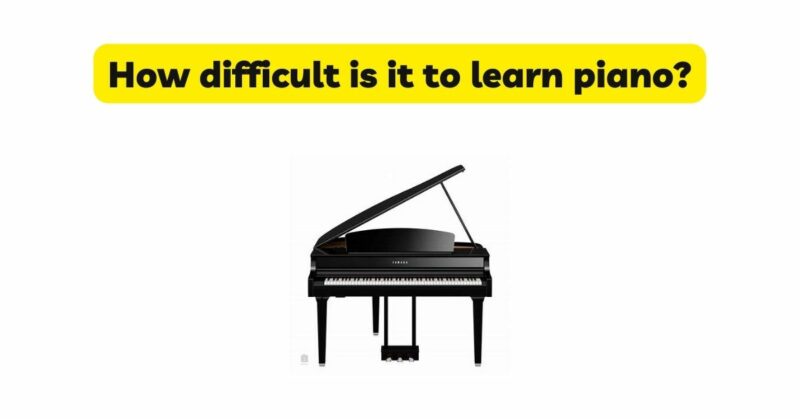Learning to play the piano is a dream shared by many music enthusiasts. The allure of creating beautiful melodies and the versatility of the instrument make it a popular choice. However, the question of how difficult it is to learn piano often arises. The difficulty level of piano learning can vary depending on several factors. In this article, we will explore the challenges associated with learning piano and provide insights into the skills, dedication, and mindset required to embark on this musical journey.
- Multifaceted Skill Set: Learning the piano involves developing a multifaceted skill set. It requires the simultaneous coordination of both hands, precise finger movements, and a deep understanding of musical concepts such as rhythm, melody, and harmony. The challenge lies in training both the mind and body to work together seamlessly to produce beautiful music.
- Music Theory and Notation: To become proficient in piano playing, a solid foundation in music theory and notation is crucial. Understanding musical symbols, reading sheet music, and interpreting complex rhythms can be daunting for beginners. Learning the language of music requires patience, dedication, and consistent practice.
- Coordination and Motor Skills: Playing the piano demands excellent hand-eye coordination, fine motor skills, and finger dexterity. Beginners may find it challenging to coordinate the movement of both hands independently while maintaining proper hand positioning and posture. Developing these skills requires repetitive practice and focused attention.
- Technique and Posture: Proper technique and posture are essential for efficient piano playing. Mastering correct hand positioning, finger placement, and posture is vital to produce a balanced and expressive sound. Developing good habits from the beginning and avoiding tension or strain is critical to long-term progress and preventing injury.
- Ear Training and Musicality: Developing a keen ear for pitch, rhythm, and tone is an integral part of learning the piano. Ear training involves recognizing intervals, chords, and melodic patterns. Developing a sense of musicality, such as expression, dynamics, and phrasing, adds depth and emotion to the music. While some individuals may have a natural inclination for musicality, it is a skill that can be cultivated through active listening and practice.
- Practice and Patience: Mastering the piano requires consistent and focused practice. Progress may not always be linear, and learners may encounter challenges or temporary plateaus. Patience, perseverance, and a growth mindset are necessary to overcome obstacles and push through difficulties. Regular and deliberate practice, even during times of frustration, is crucial for improvement.
- Time Commitment: Learning the piano is a long-term commitment that requires time and dedication. The level of proficiency one wishes to achieve impacts the amount of time needed for practice. While it is possible to make progress with as little as 30 minutes to an hour of daily practice, those aiming for advanced levels may need to dedicate more time to hone their skills. Balancing practice with other commitments and maintaining a consistent routine is essential.
- Individual Learning Style and Support: Every individual learns differently, and finding the right learning approach is key to success. Some learners thrive in a structured setting with a teacher, while others prefer self-study using online resources. Understanding one’s learning style and preferences is vital for optimizing the learning experience. Additionally, having access to guidance, feedback, and support from a knowledgeable teacher or community of fellow learners can greatly enhance the learning process.
Conclusion: Learning to play the piano is a challenging yet immensely rewarding endeavor. The difficulty of learning piano depends on various factors such as individual aptitude, dedication, practice, and the resources available. While it may seem daunting at first, with perseverance and a growth mindset, anyone can embark on this musical journey. Embracing the challenges, seeking guidance when needed, and staying committed to consistent practice will ultimately lead to the joy of creating beautiful music and unlocking the expressive power of the piano.


